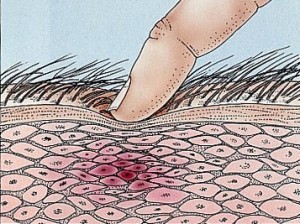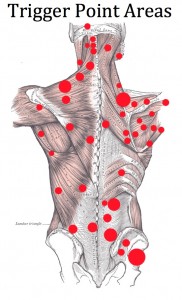What is a Trigger Point?
A trigger point is an area of muscle that is tender and painful. It may feel to patients like a knot or tight band when pressed as it may “trigger” pain in the affected area.
The pain may also radiate down an arm or leg when the trigger point is pressed. For instance, when a trigger point on the shoulder is pressed, it may send pain into the neck or down the arm. The trigger point represents an overactive muscle resulting from overuse, stress, or a spinal problem.
Effective treatments for a trigger point include exercise, physical therapy, stress reduction, posture improvement, pain medications, and trigger point injections.
What is a Trigger Point Injection?
At times, the best treatment for a painful trigger point is a trigger point injection.
A trigger point injection can relieve the pain from the tender area by reducing the muscle spasms and relaxing the “tight” knot or band.
For what disorders are Trigger Point Injections used?
Trigger point injections work well for muscle pain in the neck and back, arms, legs, and shoulder resulting from:
• Myofascial pain – chronic pain in muscle tissue
• Fibromyalgia
• Tension headaches
These pai ns can cause trigger point pains, and most commonly occur in specific areas of the body as shown on the diagram.
ns can cause trigger point pains, and most commonly occur in specific areas of the body as shown on the diagram.
A trigger point injection often helps at the beginning of pain management treatment and then is used in conjunction with additional therapeutic options to achieve best results. This may include trigger point injections followed by spinal decompression therapy, and possibly epidural injections if the person is also having symptoms of a pinched nerve (known as sciatica or radiculopathy).
Call (602) 507 – 6550 for your Appointment TODAY!
How are Trigger Point Injections Performed?
The pain management doctor will sterilize an area over the trigger point and use a tiny needle to inject through the skin. If you have ever had a TB test injection, that’s how small of a needle is being used.
The needle will cause a small “twitch” which tells the doctor the proper area has been reached. A small amount of numbing medicine is then injected, along with either a steroid or nonsteroidal medication. The patient may feel some slight burning.
It is the combination of the needle itself causing the “twitch” and the injected medicine that relieves the pain and spasms. Having stated that, research is inconclusive as to whether the steroid medication in addition to the needle plus numbing medicine adds effectiveness.
The doctor will also move the needle in and out a few times to achieve the best results around the area. The injection overall only takes a couple minutes, and afterwards slight pressure will be applied to control bleeding along with a bandage.
What are the results of Trigger Point Injections?
Right away patients typically will receive pain relief as the numbing medicine starts acting within a minute. This pain relief will last between four and twelve hours, then it wears off. After that, there may be soreness, just like a vaccine shot type of feeling.
Stretching may help at this point along with a cold pack or ice, talk to your doctor about recommended specifics. Adding a TENS unit with intermittent use may provide continued pain relief. After the numbing medicine wears off, pain relief from the steroid or non-steroidal medication should “kick in” and provide relief anywhere from a few days to a few months.
Trigger point injections may be repeated every few weeks, and are often performed in conjunction with physical rehabilitation (physical therapy type exercises), chiropractic, acupuncture, and massage.
What are the risks of Trigger Point Injections?
The risks of these injections are very low. There is a very small risk of infection, or some bleeding at the injection site. Make sure to inform your doctor if you regularly take anti-clotting medications like Coumadin.
There may be an allergic reaction to the medications used. There is also an extremely rare incidence of the needle inadvertently puncturing the lung or other organ. If the patient develops difficulty breathing after the procedure or severe nausea or vomiting, the doctor should be notified.
Another risk is that the injection may not work. If trigger point injections are done too frequently, scars may form in the area being treated.
Arizona Pain Specialists has Board Certified pain management doctors who are experts in all aspects of relieving pain. This often includes trigger point injections along with individualized treatment plans to achieve the best outcomes for complicated patients.
Call (602) 507 – 6550 to schedule your Appointment TODAY!
